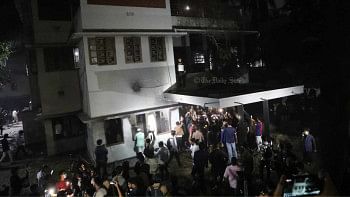Structural reforms needed to get rid of crony capitalism

All the reform commissions that have been set up might not be able to rid the country of crony capitalism without wholesale structural reforms, said Rehman Sobhan, chairman of the Centre for Policy Dialogue.
"No one is looking for any sort of structural change -- what the reforms might hopefully do is that they may take us away from a non-competitive system of crony capitalism and at least create a more competitive system," he said in an event yesterday to commemorate the CPD's 30-year journey.
Through the reform process, they are aiming to reproduce a reformed system of politics, governance and political system, he said at the event held at the Brac Centre Inn.
Regarding the self-censorship of civil society in expressing their views, he said: "Once upon a time I could write an article within three to four hours for The Daily Star. But in the last 10 to 15 years, it has sometimes taken me 10 days."
He recommended institutionalising the situation by obtaining consent from the political parties so that civil society organisations can actually function without constantly looking over their shoulders.
"This is our great expectation."
Sobhan said his colleagues became depressed when they found out that ousted prime minister Sheikh Hasina spoke harshly about the CPD after it arranged a dialogue on the 2014 election.
"I told them that you will not find any institution in the world whose thoughts are being discussed on the floor of the parliament. So, you can think that your thoughts have achieved national attention."
Hasina was looking for 80 percent marks but the CPD gave her 33 percent marks only. "So, her main complaint was why the CPD has not recognised her singular achievement in development."
In its 30-year journey, the CPD created a space for civil society to be heard.
The noted economist also called for making a citizen's commission for rural development. "Even 30 years ago, I called for reform in the agricultural sector," Sobhan added.
The CPD tried to use research to bring change in the society, said its distinguished fellow Debapriya Bhattacharya.
Free speech, free media and patriotism were criminalised in Bangladesh in the past 30 years, said Iftekharuzzaman, executive director of Transparency International Bangladesh.
"That has happened as our political and bureaucratic leadership lacked the capacity to understand that a critic can be a well-wisher. As a result, critics were treated as enemies all the time."
He also touched upon the much-talked-about 'minus two formula'.
"The so-called minus two formula was provoked by the armed forces and everybody knows it. But, the CPD, the TIB, Prothom Alo and The Daily Star were bracketed together for this," he added.
Bangladesh is now at a crossroads, so how it will go further is a big question among the people, said Matiur Rahman, editor of Prothom Alo.
"There are many ifs and buts on whether the government will turn into a weak government, whether the government will continue its reform activities."
Here, the CPD along with other civil society can play a big role in bringing about cultural, ideological and political change so that the country can go to the next level of development.
"But, this change should be acceptable to the people of the country," Rahman added.
The private sector is going through a tough time, said Rubana Huq, vice-chancellor of the Asian University for Women.
She requested not to judge the whole private sector by the misdeeds of some wrongdoers.
Many small- and medium-sized enterprises are struggling and if this struggle continues, the private sector will not rebound and create jobs.
"In the present situation, please do not allow LDC graduation," said Huq, also a former president of the Bangladesh Garment Manufacturers and Exporters Association.
Zahid Hussain, former lead economist of the World Bank's Dhaka Office; Selim Raihan, executive director of SANEM; and Mohammad A Razzaque, chairman of Research and Policy Integration for Development, also shared their experiences with the CPD.
Shanaz Karim, a consultant of the WB's Governance Global Practice; FR Mahmood Hasan, founder and member of Gonoshahajjo Sangstha; Maleka Banu, general secretary of Bangladesh Mahila Parishad; Mirza M Hassan, senior research fellow of BRAC Institute of Governance and Development; Zonayed Saki, chief co-ordinator of Ganosanhati Andolan; Mujahedul Islam Selim, presidium member of Communist Party of Bangladesh; and Kazi Mahmudur Rahman, head of Independent University, Bangladesh's department of social sciences and humanities, also talked at the event.


 For all latest news, follow The Daily Star's Google News channel.
For all latest news, follow The Daily Star's Google News channel. 








Comments